(https://doi.org/10.55612/s-5002-060)
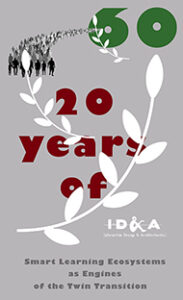

María Libertad Aguilar Carlos
is a PhD student on Applied Sciences and Technology in the Autonomous University of Aguascalientes (UAA) in Mexico. She received their master’s degree on Informatics and Computer Sciences in the same university, with experience coordinating some projects related to insertion of technology in early infancy educative environments. She is a business manager from the National Institute of Technology in Zacatecas (ITZ) with research interests focused on Agile Methodologies, Service Design, Human-Computer Interaction and Strategic Management. She has made research publications about digital ecosystems, agile methodologies, and professional training with technology support.

Maria Rosaria Autiero
Since the beginning of her career, as a school principal, she has been involved in experimenting and implementing educational and technological innovations in schools she directed, being the IIS Amaldi the last one. During the pandemic period she systematized the school’s relations with the stakeholders of the territory of reference by mean of a formal community pact – among them the University of Rome Tor Vergata, the Municipality VI and the Metropolitan City of Rome, and several ONGs – with the aims to minimize school dropout and reduce educational poverty. She has transformed the school in an open Cultural Hub, that allows other schools of the district and, as well youths and adults living in the territory of reference to use the spaces and services provided by the school (lecture hall, library, music and recording room, historical-artistic museum, laboratories and gyms), well beyond the school hours.

Pradipta Banerjee
is a PhD student at NTNU, Dept. of Computer Science. He is interested in Modelling Socioeconomic Systems, Computational Social Science, Complex Adaptive Systems, Data Science, Human-Computer Interaction, Agent-Based Modelling and Simulation. Within his PhD, he is investigating city learning or learning in cities, where cities are considered innovation ecosystems that learn from within and across cities and the role of ICT in supporting city learning. His target groups are researchers, policymakers, and public/private service providers who can drive collaborative, holistic city transformations through sustainable citizen-centric innovations.

Lola Ben-Alon
is an Assistant Professor at Columbia GSAPP, where she directs the Natural Materials Lab and the Building Science and Technology curriculum. She specializes in earth- and bio-based building materials, their life cycle, supply chains, fabrication techniques, and policy. Ben-Alon received her Ph.D. from the School of Architecture at Carnegie Mellon University, and she holds a B.S. in Structural Engineering and M.S. in Construction Management from the Technion, Israel Institute of Technology. At the Technion, Ben-Alon co-founded the Experimental Art and Architecture Lab. She has previously served as a curator and exhibition developer for Madatech, Israel’s National Museum of Science, Technology, and Space. Her work has been exhibited at the Indian Ceramics Triennial, Tallinn Architecture Biennale, Tel-Aviv Museum of Art, and the Israel Museum in Jerusalem, and published in Building and Environment, Journal of Green Building, and Automation in Construction. Ben-Alon serves on the board of ACSA’s Technology | Architecture + Design, and Elsevier’s Renewable and Sustainable Energy Reviews.

Massimo Bianchini
PhD in Design, is an Associate Professor at the Department of Design and Lab Manager at Polifactory, the makerspace – Fab Lab of the Politecnico di Milano. He teaches Integrated Product Design at the School of Design. His research interests include the relationship between design and open and distributed production, urban manufacturing, indie innovation, user-driven innovation, and circular innovation.

Maria Dorinela Dascalu
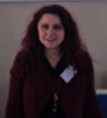
Maria-Iuliana Dascalu

Mihai Dascalu
is a full professor at UPB, responsible for the courses of Object-Oriented Programming, Semantic Web Applications, and Data Mining and Data Warehousing. He was head of the class in 2009 (e.g., GPA 10/10; ranked 1st across specialization and university) at University Politehnica of Bucharest and holds a double Ph.D. with the highest distinctions in Computer Science and Educational Sciences, with his thesis published as a book in Springer, Studies in Computational Intelligence. He has extensive experience in national and international research projects with more than 300 published papers, including 30 articles at top-tier conferences, 100+ papers indexed ISI at renowned international conferences, and 10+ Q1 journal papers.

Kristóf Fenyvesi
is Senior Researcher of STEAM (Science, Technology, Engineering, Arts and Mathematics), trans- and multidisciplinary learning and contemporary cultural studies at the Finnish Institute for Educational Research, University of Jyväskylä, Finland (https://ktl.jyu.fi/en). He is a member of University of Jyväskylä’s Research Group for Innovative Learning Environments and Tampere University’s Research Group for Education, Assessment & Learning. He is an Associate Professor of STEAM Education at Indonesia University of Education (UPI), and a Visiting Researcher of Tallinn University’s Educational Innovation Collaboration Cluster STEAM4EDU. He is Community Events Director of the Bridges Organization (www.bridgesmathart.org), the world’s largest community for mathematics and the arts. He has been the editor of the annual Bridges conference’s Workshop Paper track and coordinator of the Bridges Public Day (www.familyday.hu) since 2011.
In 2014 he became a full member of the European Academy of Sciences and Arts.
Since 2016, he has been a member of the European Mathematical Society’s Committee for Raising Public Awareness. Between 2013-2017 he served as the chief executive officer of the International Symmetry Association (www.symmetry.hu) and in 2008 he launched Experience Workshop—Global STEAM Network (www.experienceworkshop.org). He was invited by the European Commission to serve as the STEAM expert evaluator of various Horizon and Erasmus+ projects. Fenyvesi is an international evaluator for the Slovak Accreditation Agency for Higher Education and the Science Fund of the Republic of Serbia.

Carlo Giovannella
graduated in Physics, he worked long time in solid state physics as an expert of complex systems. Nowadays can be considered a “Designer for the experience”.
As past-president of the Association for Smart Learning Ecosystems and Regional Development, he is fostering the development and benchmarking of Smart Learning Ecosystems as drivers of social innovation and regional development, and the dissemination of the design literacy into the schools.
At the University of Tor Vergata he has been for more than 25 years the chair of the ISIM_garage (Interfaces and Multimodal Interactive Systems), a research lab devoted to design and development of integrated community-based environments for TEL, collaborative work and smart communities, tools and methods for education, analytics, and more.

José Eder Guzmán Mendoza
holds a PhD in Computer Science. Dr. Eder Guzmán is a full-time professor at the Polytechnic University of Aguascalientes and belongs to the Master of Science Program in Engineering in the areas of Networks and Systems. He is also leader of the Information Technologies and Telecommunications academic body (UPA-CATIT). His current research interests include Software Engineering, Human-Computer Interaction, Educational Technologies, and E-Learning. He is also a full professor at the Autonomous University of Aguascalientes, in the Department of Philosophy and Letters of the Media Education Center.
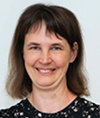
Ildikó Holik
is an associate professor at the Óbuda University Kálmán Kandó Faculty of Electrical Engineering Ágoston Trefort Centre for Engineering Education (Budapest, Hungary). She graduated as a teacher of Mathematics and Pedagogy in 2000 and as a teacher of Information Technology in 2003; she obtained a degree in Business Informatics in 2011. She obtained a PhD degree in pedagogy in 2007; her dissertation dealt with the role of practice schools for trainee teachers. She completed her habilitation in 2021, its topic is the research of the competences of engineering students in the light of labor market expectations. Her major fields of research include STEM education, engineering education, teacher training and innovative teaching methods.

Tamas Kersanszki
he serves as the Director of the STEM Office at Óbuda University. He completed his initial education in social work in 2002 at the Wesley János Pastoral Training College. Subsequently, he earned a degree in social policy from Eötvös Lóránt University in 2007, followed by a specialization in project management from Budapest Corvinus University in 2015. Currently, he is pursuing his doctoral studies at the Doctoral School for Safety and Security Sciences at Óbuda University. His research focuses on innovations and developments in STEAM (Science, Technology, Engineering, Arts, and Mathematics) as well as on the enhancement of transversal competencies.

Zsolt Lavicza
(BA, BA, MS, MA, MPhil, PhD) After receiving his degrees in mathematics and physics in Hungary, Zsolt began his postgraduate studies in applied mathematics at the University of Cincinnati. While teaching mathematics in Cincinnati he became interested in researching issues in the teaching and learning mathematics. In particular, he focused on investigating issues in relation to the use of technology in undergraduate mathematics education. Afterwards, both at the Universities of Michigan and Cambridge, he has worked on several research projects examining technology and mathematics teaching in a variety of classroom environments. In addition, Zsolt has greatly contributed to the development of the GeoGebra community and participated in developing research projects on GeoGebra and related technologies worldwide. Currently, Zsolt is a Professor in STEM Education Research Methods at Johannes Kepler University’s Linz School of Education. From JKU he is working on numerous research projects worldwide related to technology integration into schools; leading the doctoral programme in STEAM Education at JKU; teaching educational research methods worldwide; and coordinates research projects within the International GeoGebra Institute.

Gabriela Citlalli López Torres
received her PhD in Business Administration at the University of Manchester, UK. She is a research professor at the Centre for Economic and Administrative Sciences at the Autonomous University of Aguascalientes (UAA),in Mexico. Dr. López has industrial experience in the automotive and electronic sectors. She is an industrial engineer who graduated from the National Institute of Technology. Her academic experience at the University of Manchester and the BPP University in London includes coordinating the doctoral and master’s in administration postgrad programs and the Department of Academic Exchange at the UAA. Also, she has obtained level 1 at the National System of Research (SNI) in Mexico. She has research publications on knowledge management, innovation, SMEs, operations management, and sustainability in several internationally and nationally recognized journals and conferences.

Stefano Maffei
Architect and PhD in Design. Full Professor at the School of Design, Politecnico di Milano, he teaches Advanced Product-Service System and Service Design. Rector’s Delegate for Social Innovation. He’s the Director of Polifactory, the Fab Lab/Maker Space of Politecnico di Milano. He also directs the Service Design and the Design For Food Specializing Masters, POLI.design, Politecnico di Milano. He received the ADI’s (Associazione per il Disegno Industriale) XXII° Compasso D’Oro Prize for Design Research with Design Research Maps (2011).

Antoni Martinez Ballesté
Associate Professor at the Department of Computer Engineering and Mathematics of the Universitat Rovira i Virgili (URV) since 2003. PhD from the Universitat Politècnica de Catalunya (Telematic Engineering, 2004). Postgraduate specialist in the European Higher Education Area (URV Foundation, 2006). Member of the IEEE. Consultant teacher at the Universitat Oberta de Catalunya (UOC) since 2004. Senior researcher in the Smart Technologies research group (formerly Smart Health, URV) since 2014. Researcher in the Crises group (Security and Privacy, 2001 to 2017). Visiting professor at Shanghai Maritime University (China, September 2018) and LAAS-CNRS (Toulouse, France, summer 2004). Research on the application of information and communication technologies in healthcare and quality of life (smart health) and education (smart classrooms), studying from technical aspects (Internet of Things, artificial intelligence, information security) to ethics and privacy.

Zoltán Márton
is the project coordinator of the STEAM Office of Óbuda University – Hungarian STEM Platform. In 2022, he graduated as a safety technology engineer at the Bánki Donát Faculty of Mechanical and Safety Engineering of Óbuda University. In 2024, he graduated as a Teacher of Engineering (Civil and Safety Engineering) at Ágoston Trefort Engineering Pedagogy Center of Óbuda University. His research interests include STEAM (Science, Technology, Engineering, Arts, and Math) related digital curriculum development, STEAM-oriented skill development for cyberspace-based protection strategies and decision-making processes, and digitally supported experiential teaching methods for mathematics, science, and safety education. It will also work on the development of playful, interactive and safety-conscious educational content, with a focus on knowledge transfer and collaboration between generations X, Y and Z in cyberspace. He is the founding leader of the innovative Children’s Summer Universities at Óbuda University, where he focuses on developing a safetyconscious approach alongside digital competences.

Josep M. Mateo-Sanz
is Associate Professor, in the Area of Statistics and Operational Research at the Universitat Rovira i Virgili University (Tarragona), since 1998. He obtained his degree and doctorate in Mathematical Sciences from the University of Barcelona in 1992 and in 1998, respectively. He also obtained the title of Professor of basic general education (EGB) from the University of Barcelona in 1985. He belongs to the SUSCAPE group, which focus mainly on the development of quantitative tools based on mathematical programming to address the design and planning of sustainable.
He has worked on several research lines related to data protection, preservation of anonymity and statistical confidentiality. Currently, his research focuses on the application of multivariate statistical techniques to the field of environmental engineering. He has participated in 26 local, national and European projects, financed by both public and private entities, from various geographical areas. As a result of his research, he has published 40 articles in journals indexed in the JCR.
In the teaching field, his work has been recognized in 2010 with the Jaume Vicens Vives Distinction of the Generalitat de Catalunya for the adaptation of teaching in Statistics to virtual teaching-learning environments.
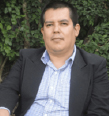
Jaime Muñoz-Arteaga
is a full-time professor at Autonomous University of Aguascalientes (UAA) in Aguascalientes, Mexico. He holds a PhD in Computer Science from the University of Toulouse I, France. He is in charge of the Computer Science area of the PhD in Applied Sciences and Technology. He has experience leading several research projects related to the digital divide, Latin-American open textbooks, and inclusive education. His research topics are in the domain of Human-Computer Interaction, e-learning, and artificial intelligence. He has published some books, two in Software Engineering, two in Human-Computer Interaction, and two related to Learning Object Technology.

Laurentiu-Marian Neagu

Melania Nitu
Teaching assistant at the National University of Science and Technology Politehnica Bucharest, alongside my role as a Solution Architect at Microsoft, with a PhD in Computer Science, my research interests span across various domains, including AI in Education, Natural Language Processing, Collaborative Learning, and Technology-Enhanced Learning.

Ramon Palau
holds a PhD in Educational Technology and is a senior researcher and lecturer at the Universitat Rovira i Virgili. His extensive research activity is carried out within the ARGET research group, focusing on educational technology and its applications in teaching and learning processes. Throughout his career, he has actively participated in several competitive research and transfer projects and has developed the role of principal investigator in 4 of them.
The author’s research encompasses three distinct lines of investigation. Firstly, he explores issues related to the Smart Classroom concept. The second line of research delves into the Flipped Classroom and Flipped Learning, especially in recent times, how this methodological approach may evolve with the emergence of artificial intelligence. The last line of research focuses on the assessment of teachers’ digital competence. The results of this research are disseminated through the publication of more than 80 articles.

Carlos Alberto Peláez

Sobah Abbas Petersen
is an Associate Professor at NTNU, Dept. of Computer Science and a Senior Research Scientist at SINTEF Digital. Her current roles include Urban ecosystems, interaction technologies for engagement, ICT Architecture and Data Management in smart and sustainable cities. She has experience in co-design processes, gamification and working with NGOs, public authorities, industry and a variety of user groups. Her recent research has also focused on supporting users and learners anytime and anywhere using mobile, ambient and blended technologies.

Neil Potnis

José Antonio Quiles-Rodríguez

Carla Sedini
is an Assistant Professor at the Design Department of Politecnico di Milano and PhD in Sociologist. She is a member of the D+S research group at Politecnico di Milano, where she combines and integrates social research and design. She has been researching and teaching issues related to Territorial Development, Social Innovation, and Quality of Life, with specific attention to fragile populations. She published a book titled “Collectively Designing Social Worlds. History and Potential of Social Innovation”.

Andrés Solano
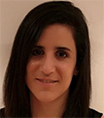
Oihane Unciti
Bachelor’s degree in Psychology from the University of the Basque Country (2011). Various training courses in the field of education, Master’s degree in Educational and Psychological Intervention from the University of Navarra (2014), Master’s degree in Secondary Education, Baccalaureate, and Vocational Training from the Isabel I University of Burgos (2016), and Master’s degree in Educational Technology from Rovira i Virgili University (2022). Currently a secondary school teacher in the Government of Navarra and pursuing a Ph.D. in Educational Technology at Rovira i Virgili University.
